Diploma of Community Services CHC52015
42 Pages7291 Words3 Views
Added on 2022-12-22
About This Document
This document provides information about Recognition of Prior Learning (RPL) for the Diploma of Community Services CHC52015. It explains what RPL is, why you should apply for it, and how to prepare for the RPL assessment. The document also outlines the four steps in the RPL assessment process and provides tips for gathering evidence to support your RPL application.
Diploma of Community Services CHC52015
Added on 2022-12-22
ShareRelated Documents
Diploma of Community Services CHC52015 Student Name:
Diploma of Community Services
CHC52015
Candidate’s Information
Self-Evaluation Forms and
Supporting Documents for RPL
Version 1.0 Nov 2019 Page 1 of 36 Training
Diploma of Community Services
CHC52015
Candidate’s Information
Self-Evaluation Forms and
Supporting Documents for RPL
Version 1.0 Nov 2019 Page 1 of 36 Training
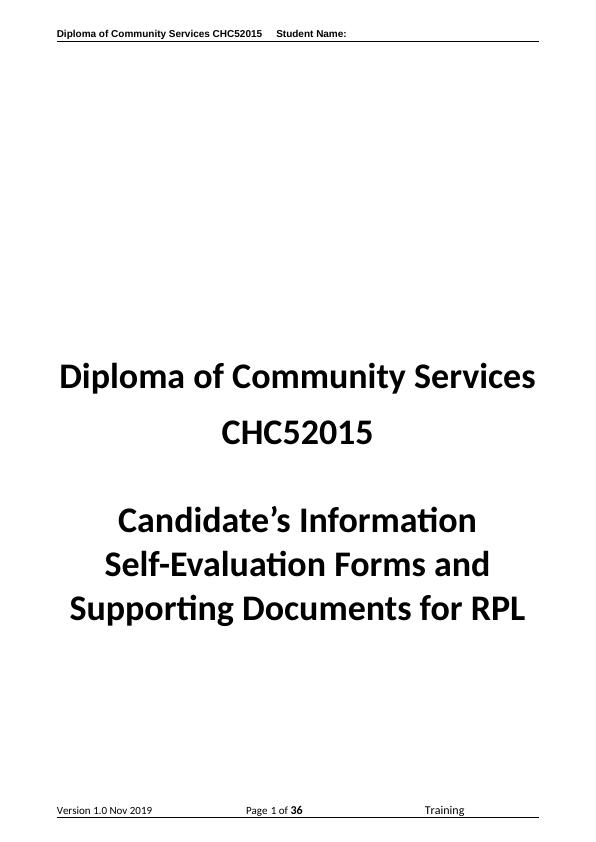
CHC40308 Certificate IV in Disability CHC40108 Certificate IV in Aged Care
Section 5 – Candidate’s Information and Self-Evaluation Forms
What is Recognition of Prior Learning (RPL)?
RPL is the acknowledgment of skills and knowledge obtained through learning achieved outside the formal
education and training system and includes work and life experience including paid and volunteer work and
skills attained through leisure pursuits such as musical, mechanical or linguistic abilities.
RPL recognises any prior knowledge and experience and measures it against the qualification in which
students are enrolled. The individual may not need to complete all of a training program if he or she
already possesses some of the competencies taught in the program.
Why you should apply for RPL
If you apply for RPL and your application is successful you could:
reduce or eliminate the need for any training in skills and knowledge you already have
save time by not needing to attend any or a reduced number of classes and completing unnecessary work
save money because you will not have to buy textbooks and other learning material
complete your qualification in a shorter time
advance to a higher-level qualification in a shorter time if desired.
Some terms you need to understand
It is important that you understand the following term to assist you with your RPL application.
Competence
Competence is the demonstration of skills and knowledge that you have gained through life and work
experiences as well as any training that you have successfully completed that can be matched against a set
of industry performance standards referred to as units of competency. These units are grouped together to
form a specific industry qualification, within the Australian Quality Training Framework (AQTF).
Each unit of competency is divided into elements (a set of activities that lead to an overall achievement or
demonstration of competence). Each of these elements is further broken down into a set of performance
criteria which give a more detailed description of the skills and knowledge you need to be able to
demonstrate.
Matching your evidence against each of the elements/performance criteria will help you to reach your
qualification more quickly.
© Department of Training and Workforce Development 2010 Page 2 of 42
Version 1, February 2010
Section 5 – Candidate’s Information and Self-Evaluation Forms
What is Recognition of Prior Learning (RPL)?
RPL is the acknowledgment of skills and knowledge obtained through learning achieved outside the formal
education and training system and includes work and life experience including paid and volunteer work and
skills attained through leisure pursuits such as musical, mechanical or linguistic abilities.
RPL recognises any prior knowledge and experience and measures it against the qualification in which
students are enrolled. The individual may not need to complete all of a training program if he or she
already possesses some of the competencies taught in the program.
Why you should apply for RPL
If you apply for RPL and your application is successful you could:
reduce or eliminate the need for any training in skills and knowledge you already have
save time by not needing to attend any or a reduced number of classes and completing unnecessary work
save money because you will not have to buy textbooks and other learning material
complete your qualification in a shorter time
advance to a higher-level qualification in a shorter time if desired.
Some terms you need to understand
It is important that you understand the following term to assist you with your RPL application.
Competence
Competence is the demonstration of skills and knowledge that you have gained through life and work
experiences as well as any training that you have successfully completed that can be matched against a set
of industry performance standards referred to as units of competency. These units are grouped together to
form a specific industry qualification, within the Australian Quality Training Framework (AQTF).
Each unit of competency is divided into elements (a set of activities that lead to an overall achievement or
demonstration of competence). Each of these elements is further broken down into a set of performance
criteria which give a more detailed description of the skills and knowledge you need to be able to
demonstrate.
Matching your evidence against each of the elements/performance criteria will help you to reach your
qualification more quickly.
© Department of Training and Workforce Development 2010 Page 2 of 42
Version 1, February 2010
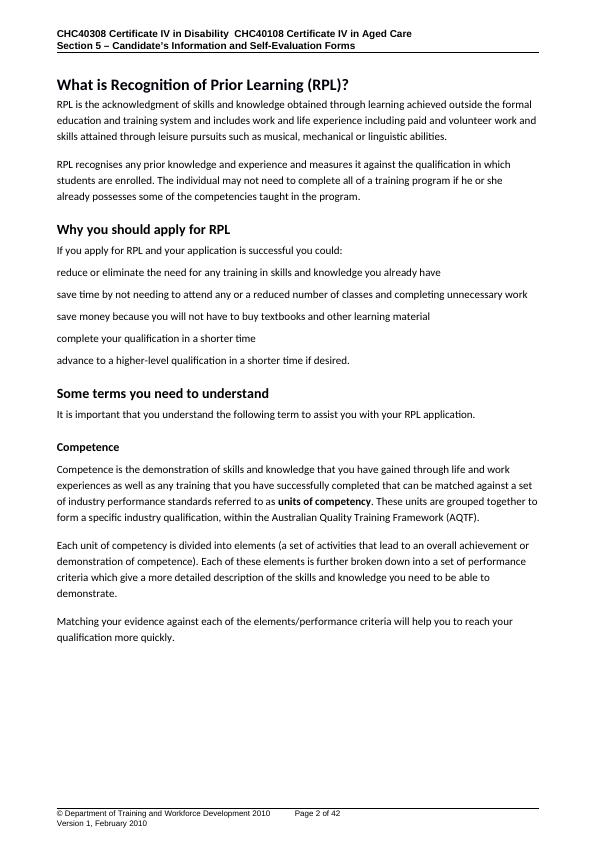
Diploma of Community Services CHC52015 Student Name:
How to prepare for your RPL assessment
In order for your skills to be formally recognised as part of a national qualification, Assessors must make
sure that you (the candidate) have the required skills and knowledge to meet the industry standard as
specified in the relevant Training Package.
You must be involved in the RPL process so that all the experience, skills and knowledge you have gained
over time can be correctly identified and suitably demonstrated. This evidence is gathered and used in
recognition of all or some of the units for the qualification you wish to gain.
All assessment requirements will be discussed with you in advance and you will be given the opportunity to
ask questions and clarify requirements. Being prepared for the assessment process and knowing what you
need to provide can save you valuable time and ensure that the RPL assessment is as simple and stress-free
as possible.
Here are some tips to make the application process and interview easier for you.
1. Your Assessor will ask you to talk about your work roles and your employment
history.
Bring a copy of your résumé. You might like to write down any work you have done in the past (paid
or unpaid) and where this took place.
2. If you have certificates from any training courses you have completed, bring along
either certified copies or the originals to the interview with the Assessor and they can
make a copy of them.
3. Bring along any other documentation that you think would support your claim that
you have done this work over time.
The following is a list of some of the documents you can provide as examples of your work history:
Examples of supporting documents:
Resume Behaviour reports/charts
Certificates/workshops attendance/qualifications/awards Medication chart
Internal training records Policies & procedures
(compliance, diversity, WHS etc.)
Job descriptions Meeting agenda & minutes
Performance reviews Continuous improvement
plans
Case notes Staff rostering samples
Written references/supporting letters Risk assessment/incident
reports/safety checks
Care/management plans Goal setting/achievement
plans
Version 1.0 Nov 2019 Page 3 of 36 Training
How to prepare for your RPL assessment
In order for your skills to be formally recognised as part of a national qualification, Assessors must make
sure that you (the candidate) have the required skills and knowledge to meet the industry standard as
specified in the relevant Training Package.
You must be involved in the RPL process so that all the experience, skills and knowledge you have gained
over time can be correctly identified and suitably demonstrated. This evidence is gathered and used in
recognition of all or some of the units for the qualification you wish to gain.
All assessment requirements will be discussed with you in advance and you will be given the opportunity to
ask questions and clarify requirements. Being prepared for the assessment process and knowing what you
need to provide can save you valuable time and ensure that the RPL assessment is as simple and stress-free
as possible.
Here are some tips to make the application process and interview easier for you.
1. Your Assessor will ask you to talk about your work roles and your employment
history.
Bring a copy of your résumé. You might like to write down any work you have done in the past (paid
or unpaid) and where this took place.
2. If you have certificates from any training courses you have completed, bring along
either certified copies or the originals to the interview with the Assessor and they can
make a copy of them.
3. Bring along any other documentation that you think would support your claim that
you have done this work over time.
The following is a list of some of the documents you can provide as examples of your work history:
Examples of supporting documents:
Resume Behaviour reports/charts
Certificates/workshops attendance/qualifications/awards Medication chart
Internal training records Policies & procedures
(compliance, diversity, WHS etc.)
Job descriptions Meeting agenda & minutes
Performance reviews Continuous improvement
plans
Case notes Staff rostering samples
Written references/supporting letters Risk assessment/incident
reports/safety checks
Care/management plans Goal setting/achievement
plans
Version 1.0 Nov 2019 Page 3 of 36 Training
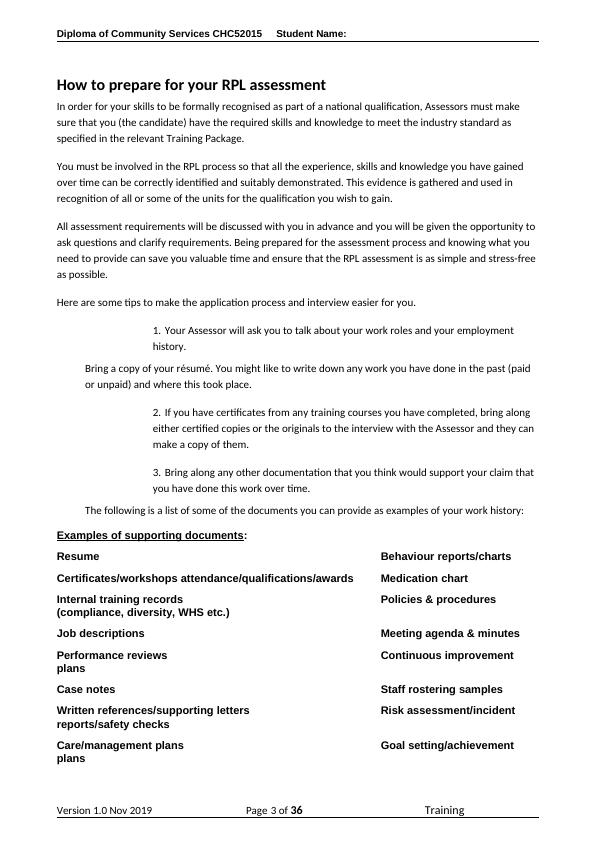
CHC40308 Certificate IV in Disability CHC40108 Certificate IV in Aged Care
Section 5 – Candidate’s Information and Self-Evaluation Forms
Other relevant documents
Depending on where you have worked and what the work may have included, you may or may not
have documentary evidence. Do not be put off if you do not have documentary evidence, as the
Assessor will work with you during the assessment process.
4. Think about whom you would consider to be your workplace contact or referee.
Is your employer happy to support your aim to become qualified?
Would you feel comfortable if the Assessor contacted your current workplace or previous
workplace/s to validate your skills and spoke to your supervisor/s or employer/s?
5. You will need to supply the contact details of work referees who can confirm your
skills in the industry.
Think about whom the best person to confirm your skill level would be.
Think about current or recent supervisors or employers who have observed your work and who
would be able to confirm your previous work skills and experience. The Assessor will need to contact
them.
6. You can speak with your Assessor about other ways you can show your skills for the
trade or industry in which you are seeking recognition.
These could include letters from employers, records of any training courses or professional
development sessions attended, employers or clients in related industries or government agencies,
acknowledgements, workplace forms (as long as there are no confidentiality issues – see below) or
any other relevant documents.
Confidentiality issues
It is important that sensitive information is not included as part of your Supporting Documentation (as
identified in Section 6 and any other documentation you wish to use as evidence). You may need
authorisation from your supervisor to use some of your evidence, so it is always best to check the privacy
and confidentiality policies of the organisation. Client names should be deleted and financial figures or
other personal details should be blacked out and made unidentifiable.
© Department of Training and Workforce Development 2010 Page 4 of 42
Version 1, February 2010
Section 5 – Candidate’s Information and Self-Evaluation Forms
Other relevant documents
Depending on where you have worked and what the work may have included, you may or may not
have documentary evidence. Do not be put off if you do not have documentary evidence, as the
Assessor will work with you during the assessment process.
4. Think about whom you would consider to be your workplace contact or referee.
Is your employer happy to support your aim to become qualified?
Would you feel comfortable if the Assessor contacted your current workplace or previous
workplace/s to validate your skills and spoke to your supervisor/s or employer/s?
5. You will need to supply the contact details of work referees who can confirm your
skills in the industry.
Think about whom the best person to confirm your skill level would be.
Think about current or recent supervisors or employers who have observed your work and who
would be able to confirm your previous work skills and experience. The Assessor will need to contact
them.
6. You can speak with your Assessor about other ways you can show your skills for the
trade or industry in which you are seeking recognition.
These could include letters from employers, records of any training courses or professional
development sessions attended, employers or clients in related industries or government agencies,
acknowledgements, workplace forms (as long as there are no confidentiality issues – see below) or
any other relevant documents.
Confidentiality issues
It is important that sensitive information is not included as part of your Supporting Documentation (as
identified in Section 6 and any other documentation you wish to use as evidence). You may need
authorisation from your supervisor to use some of your evidence, so it is always best to check the privacy
and confidentiality policies of the organisation. Client names should be deleted and financial figures or
other personal details should be blacked out and made unidentifiable.
© Department of Training and Workforce Development 2010 Page 4 of 42
Version 1, February 2010
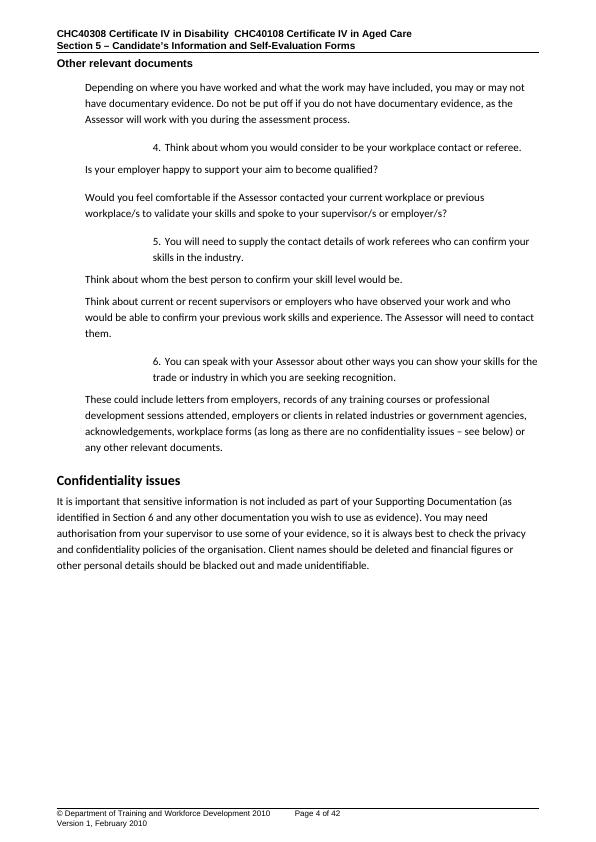
Diploma of Community Services CHC52015 Student Name:
The four steps in the RPL assessment process
Once your training organisation has provided you with the information you need to apply for RPL, you need
to follow these four steps in order to complete the process.
Step 1 –
Self-Evaluation
Before you decide to apply for RPL you need to assess your current
competence for one or several units of competency.
Complete the candidate information and self-evaluation forms provided
with as much information of your previous work experience as you can.
This will allow for an initial assessment of your experience and a check to see
whether you can demonstrate the required skills and knowledge. You can
discuss this with an RPL Assessor if you want.
You must be able to provide evidence against the elements/performance
criteria for the relevant unit/s of competency.
It is not enough to simply state that you possess the skills and knowledge
required. You must be able to demonstrate competence.
This is your opportunity to provide as much proof as you can of the variety
of experience you have had. You should supply examples of your work
history if you have any. (See Tip 3 above.)
Depending on the trade or industry you have worked in, you may or may not
have documentary evidence available. This should not deter you from
seeking RPL, as your Assessor will work with you throughout the RPL
process.
You will also need to supply the contact details of work referees who can
confirm your skills in the industry.
By asking your supervisor to complete their part of your self-evaluation, they
will be providing valuable evidence confirming the work experience, skills
and knowledge you have demonstrated in the performance of your work
duties.
You will also be provided with a list of suggested evidence that you could
use to demonstrate that you are competent in a particular unit or units of
competency. This list is a guide only. If you have other suitable evidence to
support your claim for RPL then you are encouraged to share this with your
Assessor.
If you do not believe that you have any suitable evidence, then you should
discuss your options with your Assessor.
Once you have completed the self-evaluation and made the decision that
you would like to continue with the RPL process, make an appointment for
an interview and enrol for RPL.
Note: It is possible to gain RPL for an entire qualification.
Version 1.0 Nov 2019 Page 5 of 36 Training
The four steps in the RPL assessment process
Once your training organisation has provided you with the information you need to apply for RPL, you need
to follow these four steps in order to complete the process.
Step 1 –
Self-Evaluation
Before you decide to apply for RPL you need to assess your current
competence for one or several units of competency.
Complete the candidate information and self-evaluation forms provided
with as much information of your previous work experience as you can.
This will allow for an initial assessment of your experience and a check to see
whether you can demonstrate the required skills and knowledge. You can
discuss this with an RPL Assessor if you want.
You must be able to provide evidence against the elements/performance
criteria for the relevant unit/s of competency.
It is not enough to simply state that you possess the skills and knowledge
required. You must be able to demonstrate competence.
This is your opportunity to provide as much proof as you can of the variety
of experience you have had. You should supply examples of your work
history if you have any. (See Tip 3 above.)
Depending on the trade or industry you have worked in, you may or may not
have documentary evidence available. This should not deter you from
seeking RPL, as your Assessor will work with you throughout the RPL
process.
You will also need to supply the contact details of work referees who can
confirm your skills in the industry.
By asking your supervisor to complete their part of your self-evaluation, they
will be providing valuable evidence confirming the work experience, skills
and knowledge you have demonstrated in the performance of your work
duties.
You will also be provided with a list of suggested evidence that you could
use to demonstrate that you are competent in a particular unit or units of
competency. This list is a guide only. If you have other suitable evidence to
support your claim for RPL then you are encouraged to share this with your
Assessor.
If you do not believe that you have any suitable evidence, then you should
discuss your options with your Assessor.
Once you have completed the self-evaluation and made the decision that
you would like to continue with the RPL process, make an appointment for
an interview and enrol for RPL.
Note: It is possible to gain RPL for an entire qualification.
Version 1.0 Nov 2019 Page 5 of 36 Training
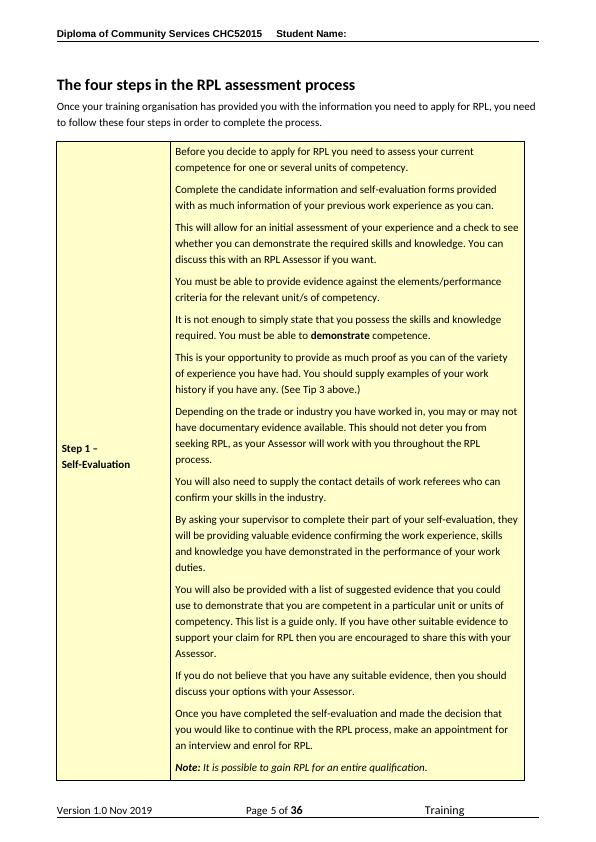
CHC40308 Certificate IV in Disability CHC40108 Certificate IV in Aged Care
Section 5 – Candidate’s Information and Self-Evaluation Forms
Step 2 – Enrolment
and interview with
the Assessor
An interview with an Assessor who understands your industry will be
organised for you. They will review – usually with you – the information and
supporting documentation you have provided and match up your skills to
the units/subjects in the qualification.
During your RPL interview, your Assessor will discuss with you your self-
evaluation and any evidence you have provided.
It is at this point that you will be able to identify any previous work
experience and discuss this with your Assessor.
During this conversation, you will be required to answer questions relating
to your work experience. This questioning forms part of the assessment, as it
will identify your current knowledge and skills regarding the area of industry
in which you are applying for recognition.
If you are currently enrolled in a training course relating to this qualification,
it is important that you let your Trainer know that you intend to apply for
RPL, then nominate the units you have selected for RPL so that the required
documentation can be processed and your application can go ahead.
It is at this stage that a decision will be made whether you are able to
proceed to the next step or whether you need to undergo gap training.
Step 3 – Provision of
further supporting
evidence
Your Assessor will need to confirm your previous work experience with
someone (such as your supervisor or employer) who can vouch for your
skills over a period of time.
They will contact the referees you have provided as part of the candidate
information.
Your Assessor may ask you to give your selected workplace contacts or
previous employers the Third Party report to complete. Authentication of
these reports by the Assessor would then be required.
© Department of Training and Workforce Development 2010 Page 6 of 42
Version 1, February 2010
Section 5 – Candidate’s Information and Self-Evaluation Forms
Step 2 – Enrolment
and interview with
the Assessor
An interview with an Assessor who understands your industry will be
organised for you. They will review – usually with you – the information and
supporting documentation you have provided and match up your skills to
the units/subjects in the qualification.
During your RPL interview, your Assessor will discuss with you your self-
evaluation and any evidence you have provided.
It is at this point that you will be able to identify any previous work
experience and discuss this with your Assessor.
During this conversation, you will be required to answer questions relating
to your work experience. This questioning forms part of the assessment, as it
will identify your current knowledge and skills regarding the area of industry
in which you are applying for recognition.
If you are currently enrolled in a training course relating to this qualification,
it is important that you let your Trainer know that you intend to apply for
RPL, then nominate the units you have selected for RPL so that the required
documentation can be processed and your application can go ahead.
It is at this stage that a decision will be made whether you are able to
proceed to the next step or whether you need to undergo gap training.
Step 3 – Provision of
further supporting
evidence
Your Assessor will need to confirm your previous work experience with
someone (such as your supervisor or employer) who can vouch for your
skills over a period of time.
They will contact the referees you have provided as part of the candidate
information.
Your Assessor may ask you to give your selected workplace contacts or
previous employers the Third Party report to complete. Authentication of
these reports by the Assessor would then be required.
© Department of Training and Workforce Development 2010 Page 6 of 42
Version 1, February 2010
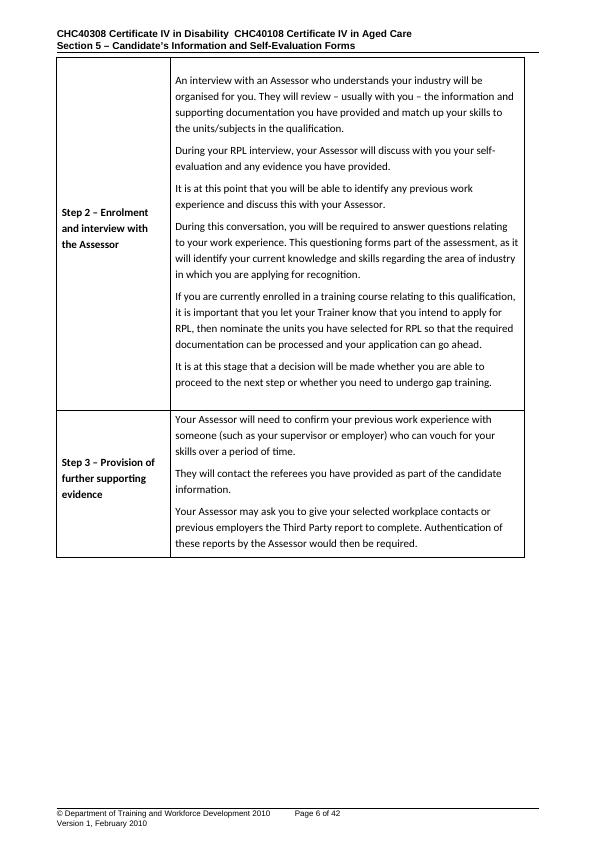
Diploma of Community Services CHC52015 Student Name:
After the assessment
After the assessment, your Assessor will advise you of the units of competency you have successfully
completed. You will also be advised whether you have gained the full qualification or if gaps have been
identified during the recognition process. If you do have skill gaps, these may be addressed through
additional training.
If you have any questions during the RPL process, you should contact your Assessor.
Version 1.0 Nov 2019 Page 7 of 36 Training
After the assessment
After the assessment, your Assessor will advise you of the units of competency you have successfully
completed. You will also be advised whether you have gained the full qualification or if gaps have been
identified during the recognition process. If you do have skill gaps, these may be addressed through
additional training.
If you have any questions during the RPL process, you should contact your Assessor.
Version 1.0 Nov 2019 Page 7 of 36 Training
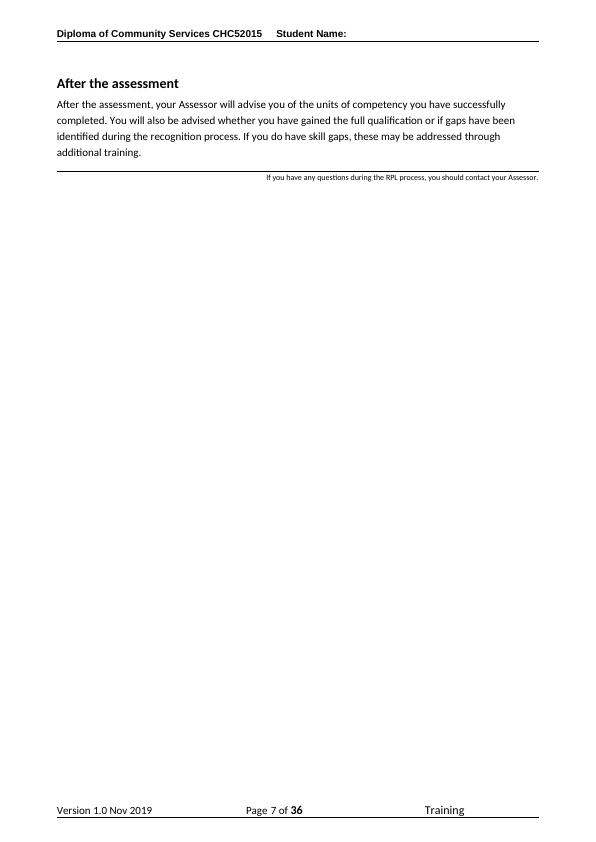
Diploma of Community Services CHC52015 Student Name:
Candidate’s Information Form
Page 8 of 36 Spectrum Training
Candidate’s Information Form
Page 8 of 36 Spectrum Training
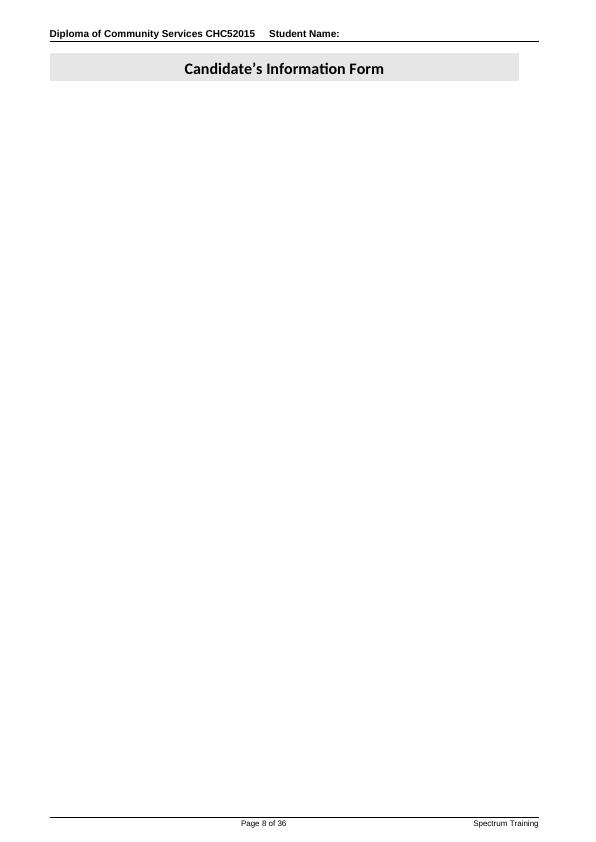
End of preview
Want to access all the pages? Upload your documents or become a member.
Related Documents
Participate in WHS hazard identificationlg...
|12
|2532
|223
BSBWHS303 Participate in WHS Hazard Identification, Risk Assessment and Risk Control - Candidate Guidelg...
|12
|2511
|492
Certificate IV in Training and Assessment - Assessment Task 4lg...
|18
|2933
|460
Certificate IV in Training and Assessment - Assessment Task 4lg...
|18
|2935
|188
RPL Kit BSBWOR502 for CHC52015 Diploma in Community Serviceslg...
|41
|8462
|290
CHCCCS004 - Assess co-existing needs RPL Kit | Deskliblg...
|57
|10577
|194
